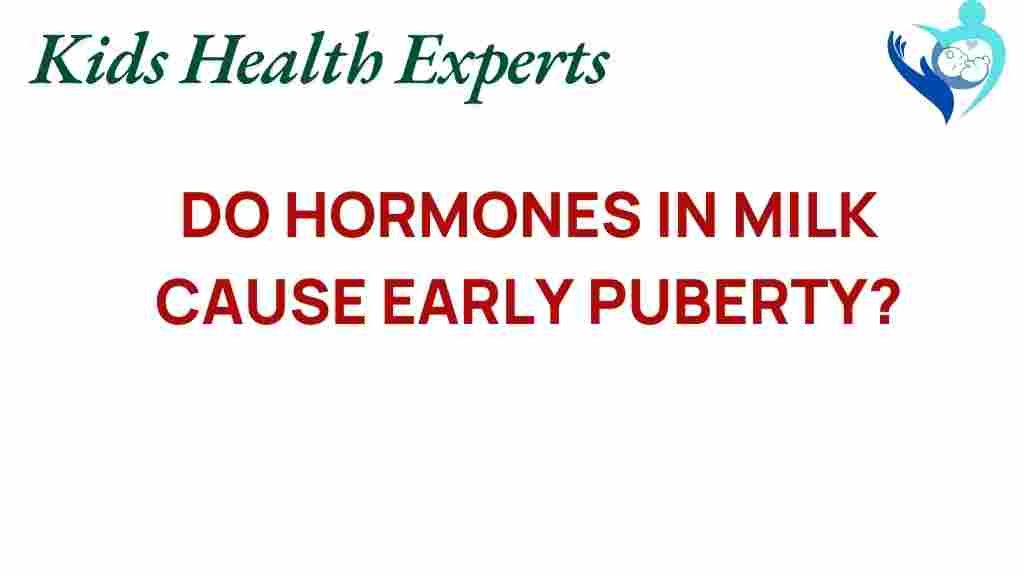Unraveling the Mystery: Do Hormones in Milk Trigger Early Puberty?
The debate surrounding hormones in milk and their potential link to early puberty has gained significant attention in recent years. As parents become increasingly vigilant about their children’s health and childhood development, understanding the implications of consuming dairy products has become more crucial than ever. This article explores the controversial subject of hormones in milk, examining the evidence, health implications, and actionable steps for concerned parents.
Understanding Hormones in Milk
Milk from cows is often treated with various hormones to enhance production. These hormones can include:
- Bovine Somatotropin (BST): A hormone that increases milk yield.
- Estrogens: Naturally occurring hormones that can influence growth and development.
- Progestins: Hormones that can also be present in milk.
While these hormones are naturally occurring, their potential impact on human health, particularly in children, has raised alarms. The concern primarily revolves around whether these endocrine disruptors might lead to early puberty.
Research on Hormones in Milk and Early Puberty
Several studies have explored the connection between hormones in milk and early puberty. Some key findings include:
- Research has shown an increase in early puberty cases over the last few decades, particularly in girls.
- Some studies suggest a correlation between dairy consumption and early onset of menarche (the first menstrual cycle).
- Hormones from dairy might interact with human hormones, potentially accelerating growth and development.
However, the scientific community is divided on these findings. While some researchers advocate for stricter regulation of hormones in dairy products, others argue that the evidence is inconclusive.
Health Implications of Early Puberty
Early puberty can have several implications for children’s health, including:
- Emotional and Psychological Effects: Children who experience early puberty may face bullying or social isolation.
- Increased Risk of Health Issues: Early menstruation in girls is linked to a higher risk of breast cancer later in life.
- Weight Gain: Early puberty is often associated with increased body mass index (BMI), potentially leading to obesity-related health problems.
Given these implications, parents must be informed and proactive about their children’s nutrition and dietary choices.
Nutrition and Dairy Products for Children
Dairy products are an essential source of calcium and other nutrients that support growth and childhood development. However, the concern about hormones in milk means that parents should be selective about the types of dairy they provide to their children. Here are some tips for choosing healthy dairy options:
- Opt for Organic Dairy: Organic milk often comes from cows not treated with artificial hormones.
- Choose Low-Fat Options: Low-fat dairy options can provide necessary nutrients without additional calories.
- Limit Processed Dairy: Avoid dairy products with added sugars and preservatives.
By making informed choices, parents can ensure that their children receive the benefits of dairy products while minimizing potential risks associated with endocrine disruptors.
Step-by-Step Process for Parents
If you’re concerned about the potential effects of hormones in milk on your child’s health, consider the following steps:
- Research Brands: Look for local dairy farms or brands that prioritize hormone-free milk.
- Consult Health Professionals: Speak with your pediatrician or a nutritionist to get personalized advice.
- Monitor Dairy Intake: Keep track of how much dairy your child consumes and adjust as necessary.
- Introduce Alternatives: Consider plant-based milk options, such as almond, soy, or oat milk, which can offer similar nutritional benefits without the hormones.
Troubleshooting Tips for Parents
Parents may encounter challenges when addressing the issue of hormones in milk and early puberty. Here are some troubleshooting tips:
- Addressing Resistance: If your child resists changing their diet, involve them in the decision-making process. Teach them about healthy choices.
- Explaining Concerns: Help your child understand why you’re making dietary changes. Knowledge can empower them to make better choices.
- Finding Alternatives: If your child loves milk, explore different non-dairy options that can provide similar tastes and benefits.
The Role of Parenting in Nutrition
As a parent, your role in shaping your child’s diet is vital. By educating yourself about hormones in milk and their potential effects, you can better guide your children towards healthy eating habits. Remember, nutrition is not just about avoiding certain foods but about providing a balanced diet that supports overall health.
Conclusion
The relationship between hormones in milk and early puberty is complex and multi-faceted. While some studies suggest a potential link, the evidence is not definitive. As parents, it is essential to stay informed and make dietary choices that align with your family’s health goals.
By exploring options such as organic dairy products, consulting with healthcare professionals, and remaining vigilant about your child’s nutrition, you can navigate this challenging issue more effectively. For more insights on parenting and nutrition, check out our article on healthy eating for kids.
Ultimately, the key is to foster a healthy relationship with food that prioritizes balance and well-being, ensuring your child’s childhood development is rooted in strong nutritional foundations.
For further reading, you can visit this resource to explore the effects of various dietary choices on child health.
This article is in the category Nutrition and created by KidsHealthExperts Team
